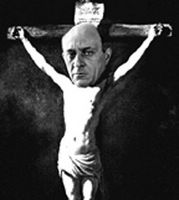Wednesday, March 23, 2005
Performance and Performers

This versus That 
To me, the distinction between “uptown” and “downtown” has a lot to do with the performers who have championed the music. Philip Glass, La Monte Young, Meredith Monk, Steve Reich, Yoko Ono, Tony Conrad, Laurie Anderson, etc., all had their own ensembles and/or performed their own music. Downtown performers play much differently than the typical conservatory trainee. Many downtown performers are also downtown composers (and vice versa).
Sadly, conservatories and schools of music (still) train their student performers to play in orchestras and perform traditional repertoire. Imagine how it might affect the world of new music (and traditional concert music as well) if instructors started exposing their student performers to an all-inclusive variety of styles and interpretive possibilities. If performers were taught to think more creatively (that is to say, to be more “creation-oriented” than “replication-oriented”), they might be excited and challenged by music that asks them to perform outside their comfort zone.
Imagine if every performer was required to compose an original piece of music and perform it on his/her Senior Recital in order to graduate. If performers were reminded of their own creativity and their capacity to freshly and freely interpret both new *and* old music, we might be able to stop worrying about the so-called “death of classical music.”
As it is now, many classically-trained performers are dismissive or hostile toward “downtown” music and its offspring because they’re taught (explicitly or implicitly) to be skeptical of what they’re not familiar with. Most orchestras and traditional ensembles will not touch a piece by Reich, Glass, Nyman, Cage (only the early works), Oliveros, etc., unless they’re sure it’s safe (“The NY Philharmonic will be happy to perform a work by Mr. Reich, as long as it’s an arrangement of a *pre-existing* piece…”)
Any thoughts?
posted by Corey Dargel
6:00 PM
|




